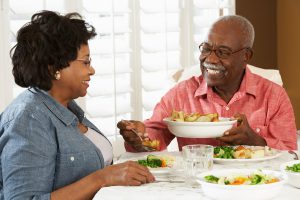By Ursuline Singleton, MPH, RD, Public Health Advisor, Office on Women’s Health (OWH); Mary Worstell, MPH, Senior Advisor, OWH; and Holly McPeak, MS, Nutrition Advisor, Office of Disease Prevention and Health Promotion (ODPHP)
 The prevention of heat-related illnesses is especially important for older individuals. Dehydration occurs when someone loses more fluids than he or she takes in and there is not enough water in their body.
The prevention of heat-related illnesses is especially important for older individuals. Dehydration occurs when someone loses more fluids than he or she takes in and there is not enough water in their body.
- Did you know many older adults may lose their sense of feeling thirsty? By the time they do feel thirst, they may be severely dehydrated.
- Did you know dehydration can be linked to confusion and falls in an older person?
Making sure that older adults drink enough fluids is critical to keeping them safe, especially during the summer when older adults have trouble responding to changes in temperature. Dehydration in older adults is a serious problem.
- Older adults might not feel thirst and may forget to eat or drink enough water.
- Older adults who have difficulty moving around or who have pain while moving may avoid getting up to get a glass of water, thereby increasing their risk of dehydration.
- Older adults with incontinence may intentionally avoid drinking fluids.
- Certain medications may interfere with the ability of older adults to hold onto fluids in their body.
- Medical conditions such as uncontrolled (or undiagnosed diabetes) or certain medications can put an older person at higher risk of dehydration.
- Older adults might be more susceptible to infections. A fever can also increase a person’s risk of dehydration.
Whatever the reason causing it, poor hydration can have serious and long-term effects in an older person including constipation, kidney stones, bladder infections, oral health diseases and, as mentioned above, mental confusion and falls.
Here’s what caregivers can do to help ensure that older adults avoid becoming dehydrated:
- Remind and support older adults to drink fluids throughout the day, even if they are not thirsty.
- Older adults may seem weak or confused because they are dehydrated. Remember to offer them water; don’t wait for them to ask. Offer medical assistance, if needed.
- Keep water accessible, using easy-to-use, non-breakable and non-tippable cups and glasses.
- Water can be found in many foods, including soups, fruits, and vegetables. Offer low-sodium broth-based soups, fruit smoothies, and salads often.
The 2015-2020 Dietary Guidelines for Americans states that beverages are an important component of healthy eating patterns. Drinking a variety of beverages, including water, is best for good nutrition and hydration. Beverages that are calorie-free—especially water—or that contribute beneficial nutrients, such as fat-free and low-fat milk and 100 percent juice, should be the primary beverages consumed.
Finally, remember that everyone can benefit from these tips for good hydration, especially family caregivers of older adults, many of whom are older adults themselves. The stress and time spent in taking care of another person can cause caregivers to forget to take care of themselves by eating healthy and getting enough to drink.
For more information:
- Protect Your Health As You Grow Older on healthfinder.gov
- Healthy Aging on WomensHealth.gov
- Beverages on DietaryGuidelines.gov